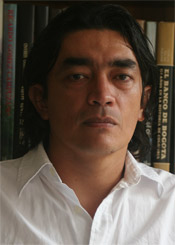Director, Screenplay, Producer
Gustavo Bolívar
Novelist, screenwriter and journalist Gustavo Bolívar Moreno, born in Girardot, Cundinamarca in July 22, 1966, gained fame with his novel “Sin tetas no hay paraíso, which has sold over 500 thousand copies in 30 different countries and has been translated into Italian, English and German. The novel was also became a successful series for Colombia’s Canal Caracol, selling in more than 20 countries and adapted for Hispanic audiences in the US by Telemundo and in Spain by Canal Telecinco. Bolivar directed the film version released in 2010.
“When I wrote Sin tetas no hay paraíso, the novel, the one on paper, I always knew the story could only really be told on film. Then, for commercial reasons, in different places around the world, several television series based on Catalina’s story were produced. Each of these productions had one thing in common: TV regulations in the various countries made it impossible to do justice to each of the different characters’ stories as told in the book. And so I decided to make the film. Only the magic and realism of the movies could do the book justice. Only the irresponsibility and out-of-control world of film could portray adolescent Catalina caught up in all kinds of craziness and searching for the answers to questions society and her surroundings created when they taught young girls from her neighborhood how to get rick quick and easy. It’s one of the drug culture’s terrible legacies that Catalina, La Diabla and their friends have to fight against.”
Bolivar attended Policarpa Salavarrieta Primary School in Girardot before his family moved to Bogotá, where he got his high school diploma from the Colegio Superior de Bachillerato. He studied Communications at the Universidad de La Sabana.
Bolivar has written eight novels and numerous scripts for news programs, docudramas, TV series, soaps, documentaries and the movies. His published works include “El candidato” (1997), “El cacique y la reina” (1998), “Así se roban las elecciones en Colombia” (2002), “Sin tetas no hay paraíso” (2005), “El suicidiario del Monte Venir” (2007), “Código de ética para infieles” (2008) and “El capo” (2008). He wrote and directed the play “Verdades que matan… de la risa” (2005) and is the author of “Los Monólogos del Pene” (2006).
His first novel “El precio del silencio” (2002) was written at age 13 and the story was adapted for television by Canal RCN 20 years later. His television screenplays include the mini-series “El cacique y la reina” (1999), “Unidad investigativa” (1999-2001); “Galán, su vida, su lucha, su muerte” (1999), “Me amarás bajo la lluvia” (2004), “Pandillas, guerra y paz” (1999-2005), “Juego limpio” (2005), “Sin tetas no hay paraíso” (2006) for Caracol Televisión; “Infieles anónimos” (2007), “Sin senos no hay paraíso” (2008) and “Los victorinos” (2009) for Telemundo; and “El capo” (2009) and “Pandillas, guerra y paz II” (2009) for Fox-Telecolombia.
Bolivar received five India Catalina nominations for Best Screenwriter at the Cartagena International Television and Film Festival in Colombia and three nominations in the same category at the TV y Novelas awards in Colombia. He won the latter on two occasions. In 2007, the series “Sin tetas no hay paraíso” won seven awards including Best Series and Best Screenwriter. He came in second in a reader’s poll published by the Colombian daily El Tiempo to determine the best-loved screenwriter of 2000 and worked with the IOM (International Organization for Migration) to promote nine gang disarmaments in different cities through a series of television programs in which he mediated peace processes. These programs went on to win a National Peace Prize in 2002.
His documentary scripts include La champeta (Cartagena, 2002); La comuna 13 de Medellín (2003); Los desplazados de Villavicencio (2002); El desarme de Popayán (2001) and Perdidos en el Cocuy (2003). He wrote the script for the short film ¿De qué color es la primavera? and the feature films No crecerás (2002), winner of an Ibermedia Program grant, Pandillas: la misión (2005) and El país de los muchachos (2007). Bolivar wrote and directed Sin tetas no hay paraíso (2010).
Filming
Director
HOUSE FOR HAIL (2017)
Director
Screenplay
HOUSE FOR HAIL (2017)
Screenplay
Producer
HOUSE FOR HAIL (2017)


